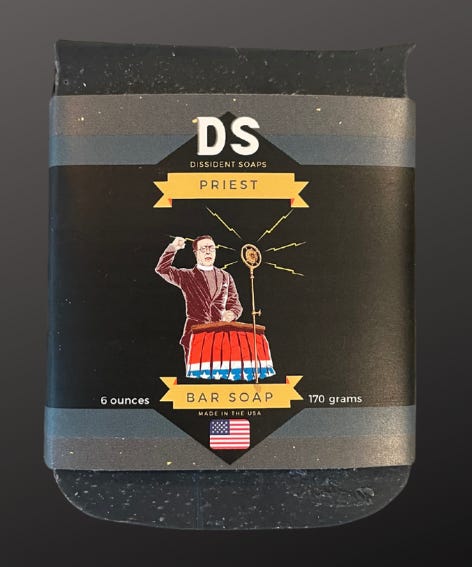It's Just Like That Other Thing, But Christian
The phenomenon of small, direct-to-market businesses selling everyday products that offer no distinguishing key value proposition from competitors (which are often less expensive and better produced), save for theirs being branded for an obsessive sociopolitical subculture, is fascinating to me. There’s such a cornucopia of offerings. One can find everything from a company taking advantage of the 1996 Telecommunications Act and others’ infrastructure to offer customers access to “America’s ONLY Christian conservative wireless provider,” to a legitimately fascist soap company. It’s a testament to the versatility of the free market.
Though, if we’re being honest, this marketing strategy is also pretty weird and kind of creepy. I wonder what type of person is so bought-in that they’re buying an $11 bar of soap that would be just like any other hand-made soap if it wasn’t branded after an insanely antisemitic priest and founder of a pro-Nazi organization. People are actually buying an overpriced bar of “Made in the USA” soap named in honor of a man whose associates were charged with plotting to overthrow the U.S. government, and who remained so virulent in his rhetoric after Pearl Harbor that his own diocese threatened to defrock him if he didn’t cease all public speaking and writing. We know these products have a notable fan base among “Reformed” Christian Nationalists.
To be fair, we shouldn’t knock the Christian Nationalists for being party to this game; the entire Reformed ecosystem is fueled by these types of strange companies. There’s an inverse correlation between the nicheness of a Reformed conference and the prevalence of vendors hawking “Reformed” tchotchkes. You’ll find conference sponsors selling “Christian” everything, from Moscow-aligned financial planning to postmillenial theonomist body armor, which brings me to my ultimate point: If you’re a lifelong Christian who reads the above and is rightfully weirded out, you now have an inkling of what it’s like to be someone not raised in the church, who came to Christ, and now has to function within American evangelicalism.
So much of everyday evangelical culture seems weird, self-unaware and cringey to us.
And we still love you, very much. You have no idea how much we’re leaning on the Spirit when we’re forced to smile and nod through normative cultural expressions, foreign to us and that we find nowhere in Scripture, but which we know you find integral to your identity. You have no idea how much some of us wish, for your own spiritual growth, you could have sympathy for black evangelicals when they express their discomfort in trying to bridge the “most segregated hour,” only to receive an emotional, and often angry, response that we’re all supposed to gather as one body—that always belligerently follows your normative cultural expressions that we find nowhere in Scripture. Though we may not want them officially formed, we don’t begrudge the desire for “affinity groups,” because we converts often naturally form our own “church within the church,” where we feel safe to express how awkward it was to sit through whatever weird, culturally evangelical thing happened in the service this week, which you were probably oblivious to. We know that, whenever we bring up such things to you, you visibly, and often verbally, bristle. We still love you through all of it and want to fellowship with you. Like the Greek speaking Christians in Jerusalem felt neglected by Hebrew Christians unwilling to step outside of their cultural norms (Acts 6:1), we just wish that you could have some appreciation for our position too.



Discovered your Substack and am very much enjoying it. And boy, do I resonate with this as an American who was raised an atheist in another country (dad was int'l investment banker) and came to faith as an adult. American evangelicalism is this bizarre ecosystem comprised of such truth, beauty and faithfulness alongside rank nuttery and vile aberrations. But every family is dysfunctional; we should expect no less. Thankfully we can avail ourselves of prayer, and continue being faithful and humble, for on any given day we may be a nut or aberrant ourselves.
Didn't realize you'd been contributing these articles, more recently. Thanks! Hygiene of the body politic in the spirit of those soapmakers in Fight Club. Wasn't Charles Haywood a shampoo maker/distributor?